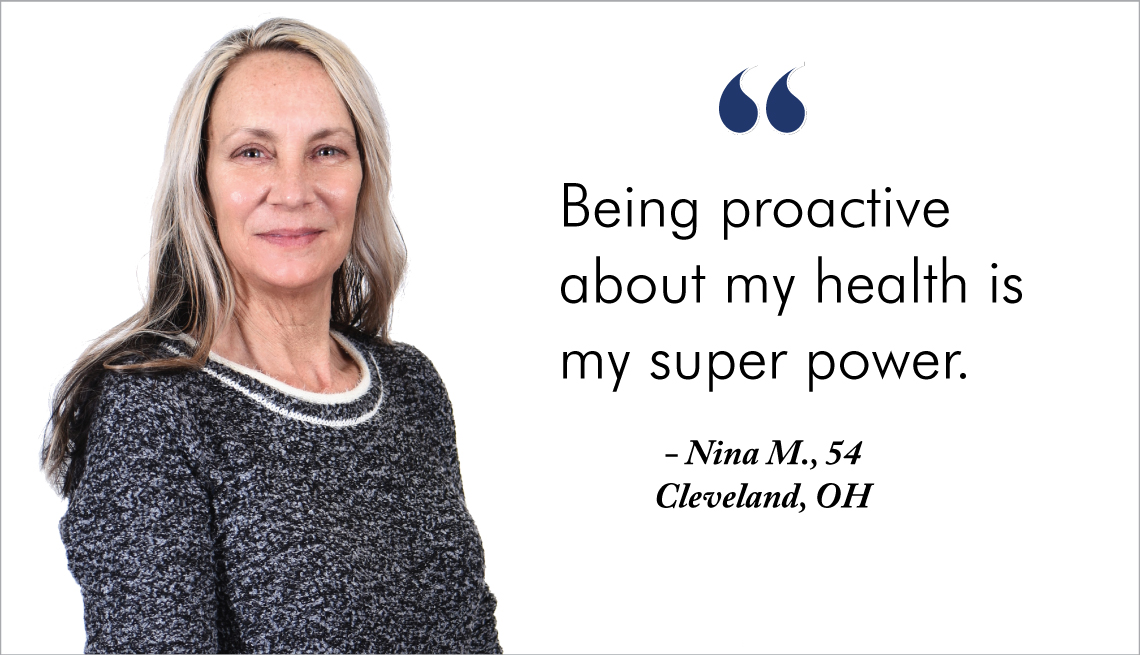Giving Thanks – 3 Stories That Demonstrate the Importance of Early Colon Cancer Screening
Give yourself the gift of screening
Ask yourself, “what are you thankful for?” The answer is likely related to the relationships you hold near and dear, as so many of us value family and friends. This is a good reason why you should be proactive about your health, so you can continue having special moments with them. And if you are 50 or over, taking care of your health should include getting a colon cancer* screening test, as your risk for the cancer increases significantly.i The good news is that if caught early, colon cancer is 90%† treatable.ii
Real Stories of Inspiration Sue, Greg and Nina share their stories. Each one of them stopped making excuses when it came to colon cancer screening and took action with Cologuard, a sensitive, noninvasive stool DNA colon cancer screening option that can be used at home.3
Minimizing Risk for Maximum Life Enjoyment: Greg’s Story
Greg’s been pretty good about seeing his doctor and taking the necessary steps to ensure he’s healthy. And when it comes to his colon cancer screenings, he’s followed doctor’s orders there too. With two routine screening colonoscopies under his belt, Greg dreaded the thought of another one and was determined to “never go through that again.” Then he remembered the brochure he picked up at a recent golf tournament about the noninvasive stool DNA screening option for colon cancer, Cologuard.
Greg contacted his doctor to see if this screening option was right for him. As Greg was over the age of 50 and at average risk for colon cancer, his doctor prescribed Cologuard. “The test arrived in the mail and I simply followed the directions – it was that easy! My test came back normal and I’m cleared for another three years – it was a hole in one!” Now Greg has the peace of mind to enjoy more golf and time with his family.
Overcoming Fears: Nina’s Story
Nina is living her best life, she runs her own business, travels a lot, and loves to go on motorcycle adventures with her husband. She’s proactive about her health - she eats right and exercises regularly. But there’s one thing she had been putting off, her screening colonoscopy. Having a screening colonoscopy was simply something she was afraid to do. Plus, she didn't want to invest the time in an invasive colon cancer screening test that required a day of prep, time off work and arranging transportation to and from the procedure. In addition, with no family history of colon cancer, she wondered how important getting screened could really be.
At her annual check-up, her health care provider brought up scheduling her screening colonoscopy and Nina spoke honestly about what was holding her back. She was pleasantly surprised to hear about a noninvasive alternative screening test that can be used at home and agreed with her health care provider’s recommendation to use Cologuard, the only stool DNA test approved by the FDA for people 50 years and older who are at average risk for colon cancer.iii
Nina’s Cologuard test result was “positive,” meaning that it detected a potential abnormality and she completed a follow up diagnostic colonoscopy, which indicated the presence of pre-cancer. Because of early detection, treatment was quick and successful.
A Screening Option to be Thankful For
There’s no reason to put off getting screened. Developed with Mayo Clinic, Cologuard’s proprietary stool DNA technology can analyze and detect 11 distinct biomarkers that identify cancer and pre-cancer. And it finds 92% of cancer in stages I-IV with 87% specificity.‡4 Plus, it fits easily into your life because there’s no prep, no diet or medication changes. You use Cologuard in the privacy of your own home, and it is covered by most major medical insurance for eligible patients and by Medicare as well.
Talk to Your Healthcare Provider about Colon Cancer
First Answer This:
- Have you ever been screened for colon cancer? Yes or No
- Have you been avoiding a screening colonoscopy? Yes or No
Then Ask This:
- What are my risk factors for colon cancer? Do I have any symptoms?
- What are my screening options? How do they differ?
- Is Cologuard right for me?
Click here to download the Cologuard Discussion Guide and Order Form today. Cologuard is available by prescription only.
About Cologuard
Cologuard is intended for the qualitative detection of colorectal neoplasia associated DNA markers and for the presence of occult hemoglobin in human stool. A positive result may indicate the presence of colorectal cancer (CRC) or advanced adenoma (AA) and should be followed by diagnostic colonoscopy.
Cologuard is indicated to screen adults of either sex, 50 years or older, who are at typical average-risk for CRC. Cologuard is not for everyone; not for high risk individuals, including those with a family history of colorectal cancer, a personal history of colorectal cancer or advanced adenoma, IBD and certain hereditary syndromes. Positive Cologuard results should be referred to diagnostic colonoscopy. A negative Cologuard test result does not guarantee absence of cancer or advanced adenoma. Following a negative result, patients should continue participating in a screening program at an interval and with a method appropriate for the individual patient. Cologuard performance when used for repeat testing has not been evaluated or established. Rx only.
* When the term colon cancer is used in this article, it is intended to encompass colorectal cancer - which includes both colon and rectal cancer.
i American Cancer Society. Colorectal Cancer Facts & Figures 2017-2019. (PDF) Accessed October 3, 2018.
† 5-year survival rate
ii Noone AM, Howlader N, Krapcho M, Miller D, Brest A, Yu M, Ruhl J, Tatalovich Z, Mariotto A, Lewis DR, Chen HS, Feuer EJ, Cronin KA (eds). SEER Cancer Statistics Review, 1975-2015, National Cancer Institute. Bethesda, MD, based on November 2017 SEER data submission, posted to the SEER web site, April 2018. Accessed July 24, 2018.
iii The Sensitivity Of Stool DNA (sDNA) Screening For Colorectal Cancer. Cologuardtestcom 2018. Accessed October 3, 2018.
‡ Both false positive and false negative results occur. In a clinical study of Cologuard, 13% of people with a positive Cologuard had a diagnostic colonoscopy that did not detect cancer or precancer. A negative Cologuard test result does not guarantee absence of cancer or advanced adenoma. Following a negative result, patients should continue participating in a screening program at an interval and with a method appropriate for the individual patient.
4 Imperiale TF, Ransohoff DF, Itzkowitz, et al. Multitarget stool DNA testing for colorectal-cancer screening. N Engl J Med. 2014;370(14):1287-1297.





